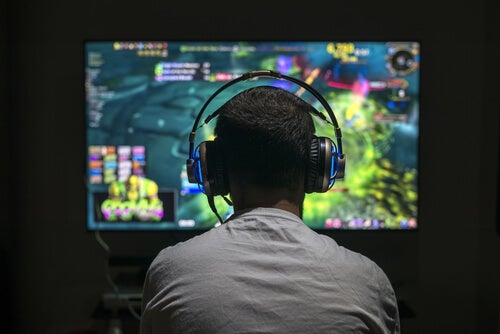The Psychological Benefits of Video Games


Written and verified by the psychologist María Vélez
It’s common to hear about the harmful effects of video games all over the media. However, for the most part, this is mere sensationalism based on unverified claims. For this reason, and due to their popularity, there’s a growing interest in investigating the psychological benefits of video games.
Video games are one of the main entertainment options for a large part of the world’s population. In addition, due to the advancement of technologies and connectivity, there’s also a large portion of casual gamers. Approximately 30 percent of people play games on their tablets and 70 percent on their cell phones.
These types of games are most popular among young adults around the age of 30. However, most people are exposed to them during childhood. In fact, there are many applications that aren’t only entertaining but also educational with a gamification component.
“If Pac-Man had affected us as kids, we’d all be running around in dark rooms, munching pills, and listening to repetitive electronic music.”
-Marcus Brigstocke-

The effects of video games
Generally, research focused on video games aims to resolve certain issues, such as:
- The long-term effects of video game exposure.
- Whether they have positive effects on cognition, emotions, motivation, or at a social level.
- If they cause negative effects due to the visualization of graphic violence, if they’re addictive, and whether they decrease academic performance.
This article will describe the main psychological benefits of video games.
Cognitive benefits
Attention
This cognitive process is one of the most studied. The involvement of the attentional networks during games is necessary to be able to start the rest of the processes. Thus, some studies reveal that video games improve attention capacity in general. More specifically, continuous play is due to an improvement in selective, divided, and sustained attention.
For example, some people observed that non-gamers have, compared to gamers, higher activation of the selective attention system. This means those who play video games require fewer resources to perform the same task, or perhaps their resources are more efficient.
Likewise, there’s a link between the use of video games and greater activation of the midline theta rhythm. This electromagnetic frequency of the brain is directly related to focused attention. Therefore, video games lead to greater concentration, which, moreover, seems to increase with practice.
The differences found according to the type of video game are also interesting. For example, it seems that action video games improve selective attention more than puzzles or strategy games. This is because they require a faster and more precise pace.
Visuospatial skills
These skills allow humans to perceive, recognize, and manipulate visual stimuli, as well as to coordinate and navigate in space. Given that video games are visual, interactive tasks, one could expect them to have an effect on these skills.
On the one hand, some studies found an increase in the right hippocampus in both veteran gamers and those training for a specific period of time. This area of the brain is responsible for visuospatial skills. Likewise, users of logic or puzzle games show increased activation of areas related to spatial memory.
Cognitive control
It’s common to find oneself in situations in which one must make a decision during a game. For example, one strategy must be interrupted and another chosen quickly, or a lot of information must be analyzed in order to advance in an adventure at a given moment. These situations are monitored by cognitive control, those that include working memory, inhibition, and task switching.
Thus, due to video game training, there are visible changes in the activation of areas related to cognitive control, such as the prefrontal cortex, parietal areas, and the basal ganglia.
However, activation depends on the difficulty of the game, age, skill, and level of interest. These changes seem to be long-lasting. Studies reveal they’re maintained, even in a resting state. In other words, even while a person isn’t playing a video game.
Interestingly, depending on the genre of the game, the activated areas (and cognitive processes) are different. For example, there seems to be an increase in the amount of information one can memorize with strategy video games.
There’s also a connection between 2D action games and improved problem-solving and reasoning. Thus, puzzle games or brain training games improve working memory.

Other perks of playing video games
In addition to improvements in specific cognitive processes, video games seem to play a significant role in procedural learning. Specifically in visuospatial processing, visuomotor integration, and motor planning and execution.
As you can see, the psychological benefits of video games also include increased motivation, self-regulation, self-confidence, and social skills. It can even increase values such as teamwork, cooperation, self-improvement, and respect, depending on the type of video game.
All cited sources were thoroughly reviewed by our team to ensure their quality, reliability, currency, and validity. The bibliography of this article was considered reliable and of academic or scientific accuracy.
- Palaus, M., Marron, E.M., Viejo-Sobera, R. y Redolar-Ripoll, D. (2017). Neural basis of Video Gaming: A Systematic Review. Frontiers in Human Neuroscience, 11:248.
- García-Naveira Vaamonde, A., Jiménez Toribio, M., Teruel Molero, B. y Suárez, A. (2018). Beneficios cognitivos, psicológicos y personales del uso de los videojuegos y esports: una revisión. Revista de Psicología Aplicada al Deporte y al Ejercicio Físico, 3(2), 1-14.
This text is provided for informational purposes only and does not replace consultation with a professional. If in doubt, consult your specialist.








